Fred Sandback / Corner Constructions
Fred Sandback (Bronxville, New York 1943-2003)
built his sculptures in spaces that had come to him through the circumstances of his artistic work, spaces that had been put at his disposal. For a period of years, the Fred Sandback Museum in Winchendon offered a unique constellation of possibilities. This was a peculiar and remarkable institution, supported and financed by the Dia Art Foundation and housed in a building whose many different rooms had previously been dedicated to other purposes.
Sometimes the studio was the place for testing and defining simple works. In most cases, however, the architectural conditions and exhibition situations in galleries, museums and other arts venues – anything but perfect “White Cubes” – constituted the fixed parameters for the temporary installation of his works. Occasionally private home interiors prompted the artist to incorporate personal motives and references associated with the collectors. The normal proved to be the exceptional and Fred Sandback liked and collected these exceptionalities.
From the 1970s onwards, black, white and colored acrylic yarn in one or several strands was his preferred working material. It enabled subtle differentiation in the visibility of the sculptures, which appropriate the found locations or, at times, merely partial aspects of spaces.
The fact that Fred Sandback saw himself as a “sculptor” and his works as “sculptures” might be disconcerting but this assignation is highly elucidatory. Against the background of such terminology, it becomes clear what is present as a material and what is absent, along with the fact that emptiness and intermediary space possess a distinct capacity to be formed and shaped.
Despite its extreme economy, the acrylic yarn never disowns its physical properties and origins, with its slightly frayed texture recalling lines drawn with a soft pencil. It is compelling in its mode of appearance, its utilitarianism and its suitability.
In early works by Fred Sandback, the material-specific restrictions are sometimes outwitted and bypassed. Soon, however, the limited formal possibilities become a welcome and by no means peripheral condition in the development of the formal vocabulary. While the chosen definition of form characterizes a work, it only plays a supporting role and not the main role. Many aspects are situation-specific and situation-dependent. The sculpture is an intervention in a found architectonic space that thus becomes part of a whole. It does not seek to displace space with material, to degrade it into peripheral or presentational space. Marking a consistent and coherent presence, sometimes visible, sometimes practically invisible, the lines give rise to a specific place capable of revealing properties that were previously beyond perception, beyond experience.
Does this function to make the abstract potential of spatiality visible or concrete? Do these concise and precisely defined formulations mean the introduction of a perceptually conditioned level of aesthetic reflection leading to new differentiations and distinctions and probing the interconnections in a new way? Or does this experience result from the projection of the viewer, supplementing and constructing, continually shifting his viewpoint in the literal sense of the term and incorporating it in the perception of the work? In any event, the viewer cannot remove himself to the perspective of an external outpost, for he is involved through his physical presence as part of the action. The work’s form and reception are interrelated and mutually dependent.
Since 1971 the gallery has accompanied the work of Fred Sandback with twelve exhibitions.
Amy Baker Sandback has curated the current show with works from the estate.
Installation views

Installation view room 4
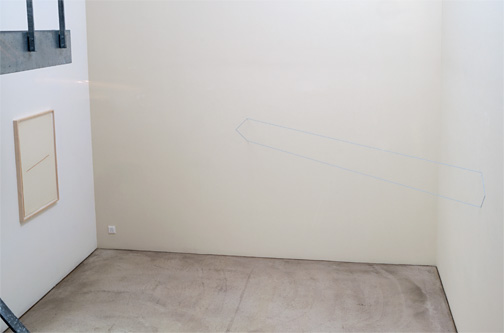
Installation view room 1

Installation view room 1

Installation view room 2

Installation view room 2

Installation view room 2
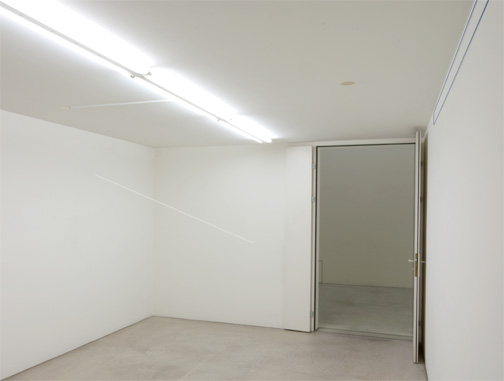
Installation view room 3
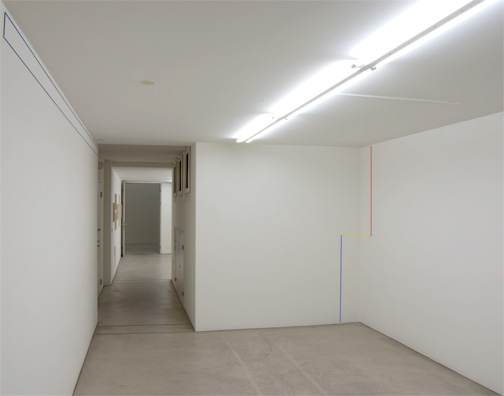
Installation view room 3
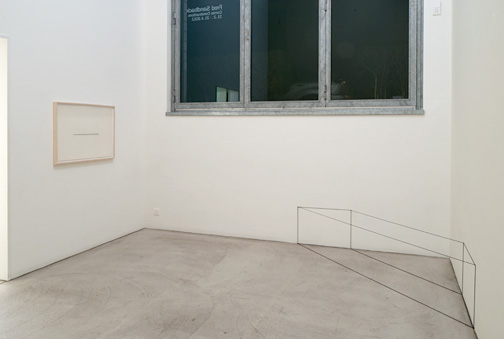
Installation view room 4
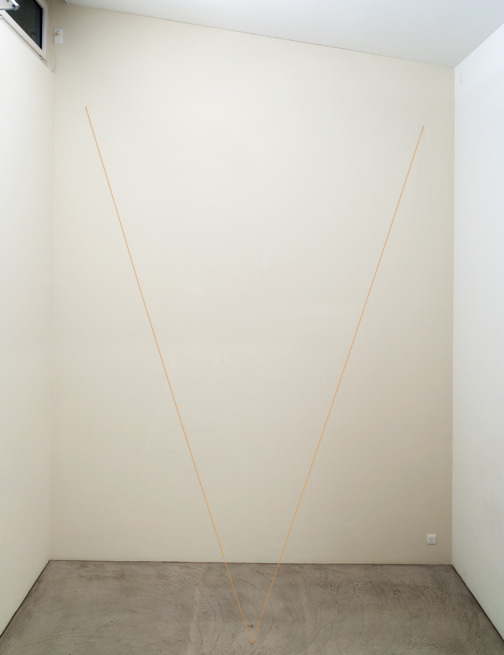
Installation view room 4

Installation view office room
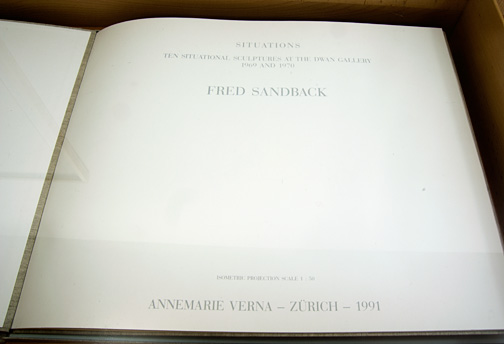
Installation view office room
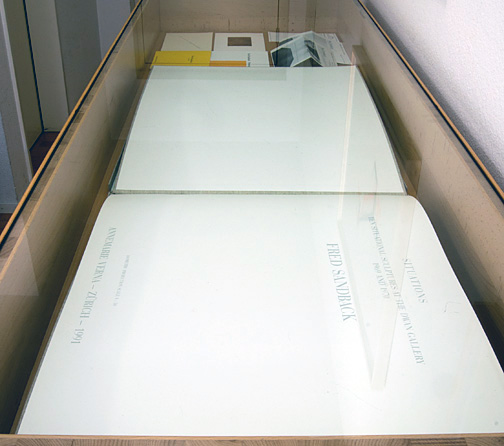
Installation view office room
Works

Untitled
1990
56.5 x 76.2 cm / 9.5 x 10.25 "
Pastel on paper
FLS 0079
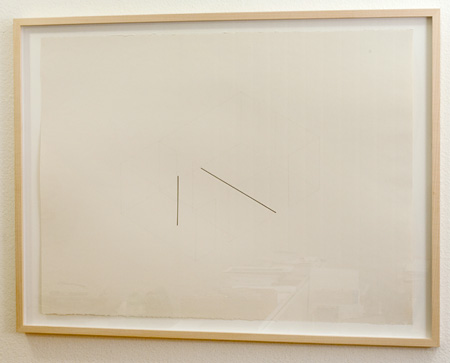
Untitled
1980
57.1 x 76.2 cm / 9.5 x 10.25 "
Ink and pencil on paper
FLS 0086

Untitled
1974
20.6 x 30.5 cm / 8 1/8 x 12 "
Felt tip pen on sketchbook paper
FLS 0852
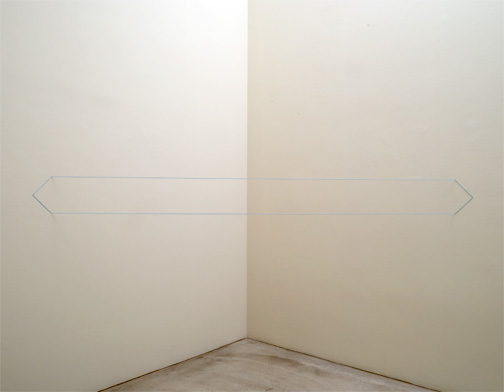
Untitled
1991
25.4 x 221 x 221 cm
Light blue acrylic yarn
FLS#2278
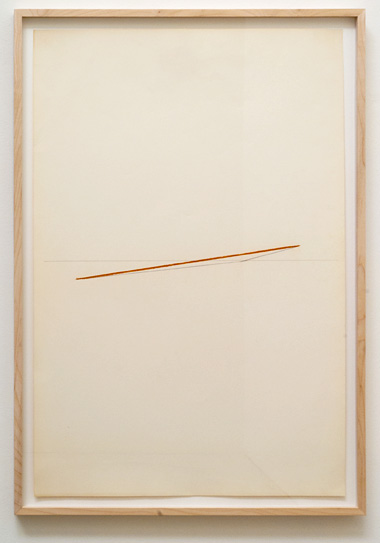
Untitled
1974
88.9 x 58.7 cm / 35 x 23.125 "
pastel and pencil on paper
FLS 0386
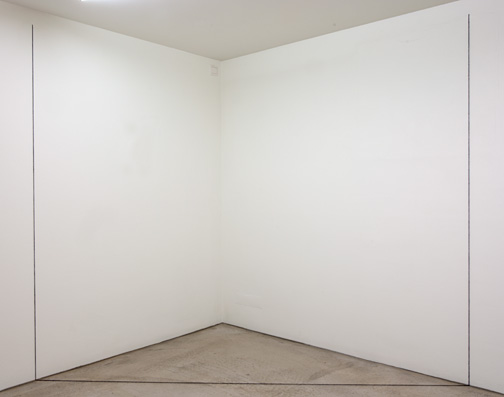
Untitled
1976
Situational
Black acrylic yarn
FLS#2490.1

Untitled
1976
Situational
Black acrylic yarn
FLS#2490.1

Untitled
1968 (RRR)
3-parts
Steel and elastic cord
Fluorescent orange
FLS#2026
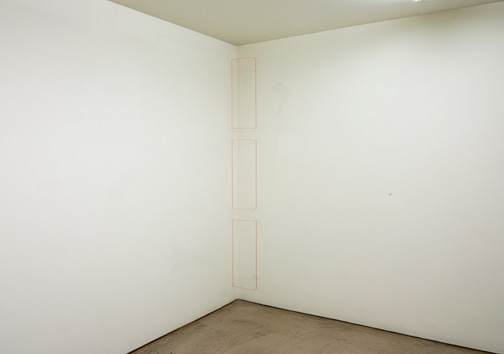
Untitled
1968 (RRR)
3-parts
Steel and elastic cord
Fluorescent orange
FLS#2026
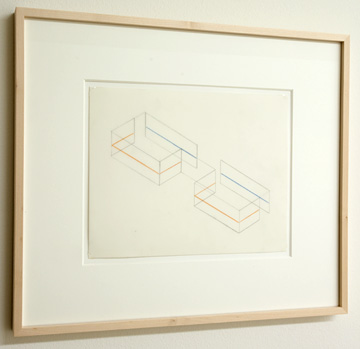
Untitled (Study for Annemarie Verna Gallery, Zürich)
1990
21.6 x 27.9 cm / 8.5 x 11 "
Pastel pencil and pencil on vellum
FLS 0207

Untitled (Corner Studies)
1971
20.3 x 23.5 cm / 9.5 x 10.25 "
Pencil on paper
FLS 0947
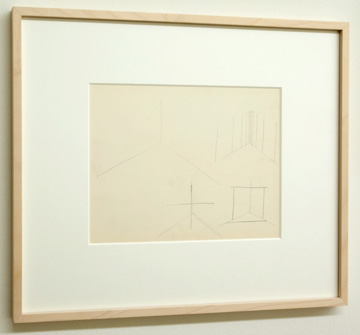
Untitled
1971
21.6 x 27.9 cm / 9.5 x 10.25 "
Pencil on heavy white paper
FLS 0937

Untitled
1974
21.6 x 27.9 cm
Pencil on paper
FLS 0170
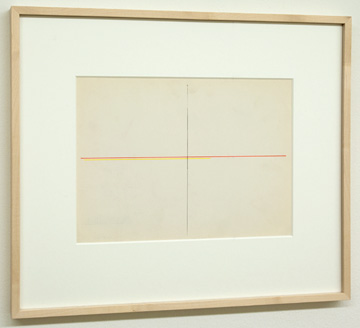
Untitled
1972
22.9 x 30.5 cm
Red and yellow pencil on Strathmore Shelburne
FLS 201

Untitled
1972
22.9 x 30.5 cm / 9.5 x 10.25 "
Red and yellow pencil on Strathmore Shelburne
FLS 351

Untitled
1972
22.9 x 30.5 cm
Yellow ink on notebook paper
FLS 677

Untitled
1972
22.9 x 30.5 cm / 9.5 x 10.25 "
Beige and ochre on sketchbook paper
FLS 878
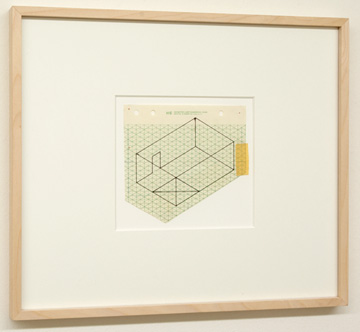
Untitled (Study for Rindge Studio)
1980
13 x 15.5 cm / 9.5 x 10.25 "
Felt tip pen on printed isometric paper
FLS 0891
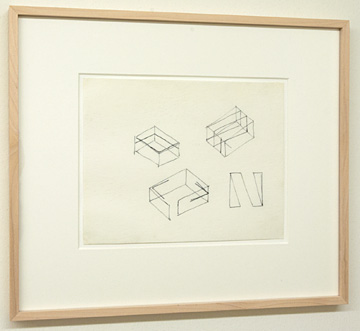
Untitled
1976
20.3 x 27.9 cm / 9.5 x 10.25 "
Felt tip pen on tracing paper
FLS 164

Untitled (Long Blue Piece)
1969
Situational
Blue elastic cord
FLS#2049

Untitled (Long Blue Piece)
1969
Situational
Blue elastic cord
FLS#2049

Untitled
1990
3-part corner construction
Height: 228.6 cm
Red, yellow and blue acrylic yarn
FLS#2488.2

Untitled
1990
3-part corner construction
Height: 228.6 cm
Red, yellow and blue acrylic yarn
FLS#2488.2

Untitled
1972/96
Diagonal
79.4 x 141 x 143.5 cm
White acrylic yarn
FLS#2182

Untitled
1974
58.7 x 88.9 cm / 23.125 x 35 "
Pastel and pencil on paper
FLS 0384

Untitled
1967
45.7 x 172.4 x 45.7 cm
Grey elastic cord
FLS#2000
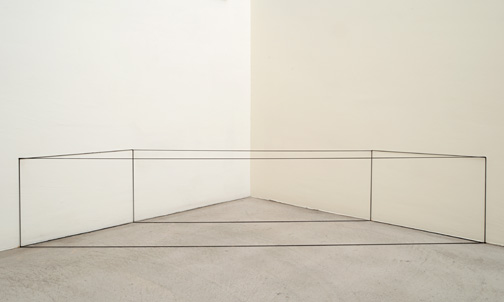
Untitled
1967
45.7 x 172.4 x 45.7 cm
Grey elastic cord
FLS#2000

Untitled
1999
Dimensions variable
Ochre acrylic yarn
FLS#2157
New
Exhibition
Dan Flavin (1933–1996) and Will Insley (1929–2011)
March 6 to April 26, 2024
New publications
James Bishop
James Bishop
Publisher: ER Publishing, Edited by Molly Warnock
Joseph Egan
Joseph Egan and Anton Himstedt: Common Ground
Publisher: Josef Albers Museum Quadrat Bottrop, Ulrike Growe
Exhibitions / Insight
INSIGHT #3 spotlights the graphic work of Fred Sandback through three examples from 1974 and 1982.
Joseph Egan, Ptolemäus: Die Welt im Griff? Antike Kartographie und zeitgenössische Kunst, Kunsthaus Grenchen
3. März bis 26. Mai 2024
Dan Flavin, Widmungen aus Licht, Kunstmuseum Basel
2. März bis 18. August 2024
Rita McBride, Momentum,
Dia Beacon, Beacon, NY,
July 1, 2023 to January 2025
Fred Sandback, Kurt Büsser ermöglicht... Erich Buchholz und Fred Sandback, Museum Wiesbaden
19. Januar bis 14. April 2024
Sol LeWitt (1928–2007)
A Wall Drawing Retrospective
Yale University Art Gallery and Williams College Museum of Art
November 16, 2008 – 2033

